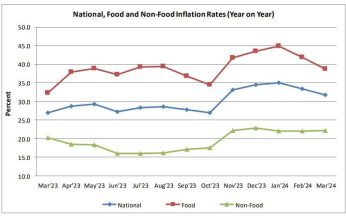Payroll audit to save Malawi k4.1 billion
Government says the recent civil service payroll audit will save the economy about K4.1 billion which was being lost to ghost workers.
Minister of Finance, Economic Planning and Development Goodall Gondwe has said this in his Letter of Intent (LoI) which was submitted to the International Monetary Fund (IMF).
“We conducted a payroll audit to strengthen control over the wage bill with donor funding. The payroll audit revealed a number of weaknesses in internal controls in management of the wage bill,” said Gondwe in letter.
He said government has since taken measures to deal with the weaknesses identified by eliminating ghost workers, stopping illicit editing of the salary schedule, ceasing overstating salary funding and eliminating employees beyond the retirement age.
“We …concluded a headcount in April 2016, which revealed that an estimated 10 percent of the labour force of 177 000 employees needed further tracking to establish their authenticity.
“We resolved to remove all the suspected employees from the payroll and examine their cases as they come forward to present them. Of these, an extricated 2 300 are unquestionably physically non-existent in the system.
These measures, Gondwe told IMF, are expected to result in a reduction in the wage bill by an estimated amount of K4.1 billion this fiscal year.
Payroll audit is part of many reforms, Malawi is supposed to implement under the IMF’s staff monitored Extended Credit Facility.
The ECF programme implementation initially suffered from policy slippages and prevented from Malawi completing the seventh review.
In particular, the country missed the end-June 2015 performance criterion (PC) on net domestic financing by a large margin and most programmed public financial management reforms were not met.
However, since then Malawi made good progress with structural reforms in the financial sector including reducing borrowing, in particular, net domestic financing at end-December 2015 was contained substantially within the programmes ceiling.
To remain on course, government has frozen civil servants recruitment apart from the recruitment of 10 500 teachers, a move Gondwe said would ensure that the wage bill is in check.
On pension reforms, Gondwe said government is committed to the reform of public pension scheme to ensure its long-term fiscal viability.
He said under the Pension Act of 2010, government was supposed to transform its defined benefit civil servant pension system into a defined contribution scheme. However, investigation—including with the help of IMF technical assistance—has determined that the size of the pension liability renders this fiscally untenable.
“Furnishing the scheme with the necessary reserves for it to operate as a defined contribution scheme would require issuance of assets exceeding 60 percent of GDP. Such asset transfers are beyond the means of the government and, in any event, could not be accommodated by nascent capital markets without severe disruption. Moreover, we have determined that even the existing defined benefit public pension scheme is not sustainable—in the absence of reserves commensurate to the scheme’s liabilities, servicing accrued benefits would require disproportionately high budget subsidies,” writes Gondwe.
The finance minister said that is why government will soon revisit the proposed pension reforms by concentrating on parameter adjustment to reduce the liabilities of the current system.
Following these commitments, last week the IMF board increased loans by $76.8 million.
IMF deputy managing director Min Zhu in a statement said it was also augmenting Malawi’s Extended Credit Facility (ECF) arrangement, signed in 2012, by another six months with funding equivalent to $49.2 million. n






You can not claim victory by just removing ghost workers from the pay roll without apprehending and prosecuting the people responsible for creating these so called ghost workers in the first place.
Why is it so difficult to find the people responsible for these ghost workers, do we have a Fiscal police in Malawi who can trace where the money paid to these ghost workers was going? Or are you telling us that we are a failed state that does not have such resources to conduct this less complex investigation?
Or perhaps this is a confirmation to what we have known for quite some time that the people responsible for these ghost workers are part of the establishment?